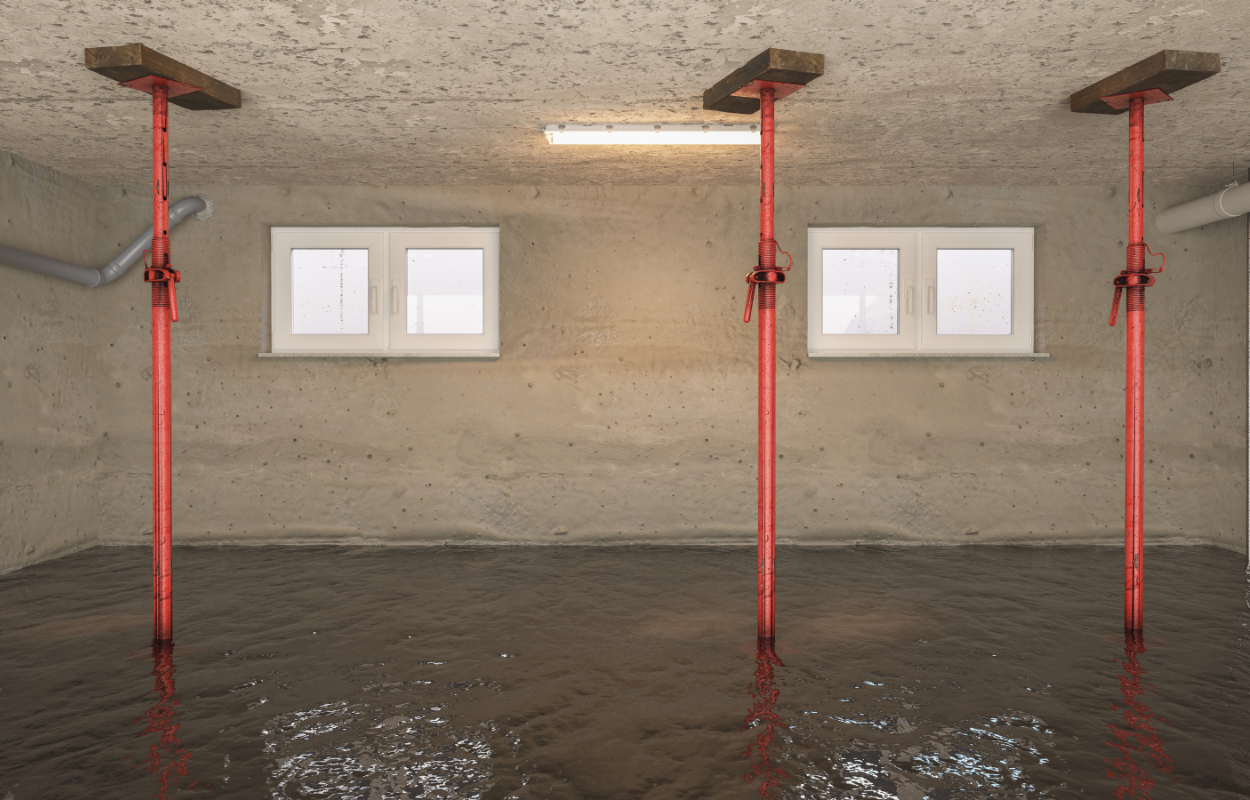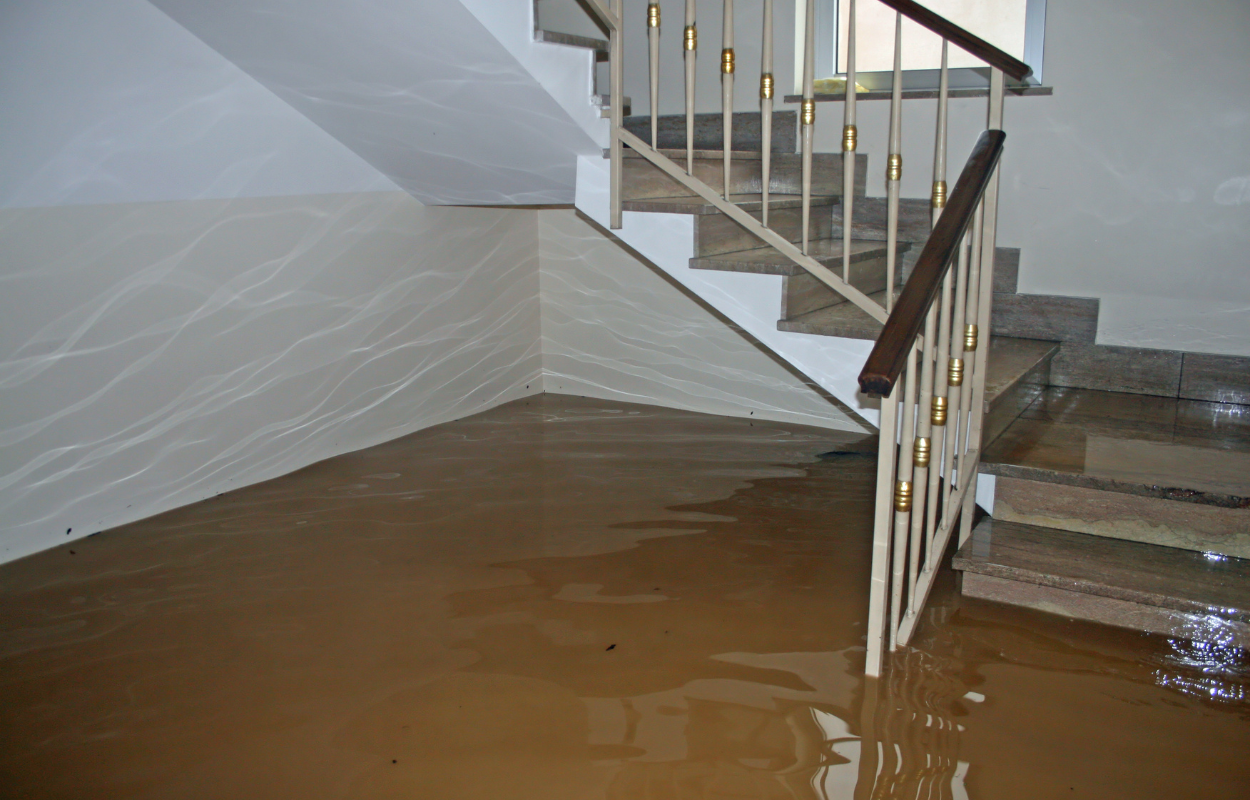
By 911 Water Damage Blog / in basement water removal /
Must-Know Tips For Basement Flood Water Removal
A flooded basement can cause significant damage to your property and pose health risks due to mold and bacteria growth.
Quick and effective water removal is crucial to mitigate these issues.
This article provides top tips for removing basement flood water and answers common questions related to the process.
Let’s get right into it!
10 Tips For Basement Flood Water Removal
- Ensure Safety First
The first and most critical step when you discover a flooded basement is to ensure safety. Turn off the electricity in the affected area to avoid electrical hazards. Water and electricity are a dangerous combination, and even a small amount of water can pose a significant risk. If the circuit breaker is located in the basement and is inaccessible due to water, call an electrician to handle it.
Wearing protective gear is also essential. This includes waterproof boots, gloves, and a mask to protect yourself from contaminants in the water. Flood water often contains harmful bacteria and other pollutants that can cause serious health issues.
- Identify and Stop the Source of Flooding
Identifying and stopping the source of flooding is crucial to prevent further water damage. If the flood is due to a burst pipe, you’ll need to shut off the main water supply to stop more water from entering your home. If the flooding is from external sources, such as heavy rain or melting snow, ensure that your drainage systems are working properly.
Check your plumbing for leaks or broken pipes. Look for foundation leaks and inspect walls and floors for cracks that might be allowing water to seep in. If the problem is external, ensure that water from heavy rain or melting snow is not entering your basement due to poor drainage.
- Remove Standing Water
Removing standing water is the next step in the cleanup process. Use a submersible pump to remove large volumes of water efficiently. These pumps are effective for significant flooding situations. For smaller amounts of water, a wet/dry vacuum can be very useful.
For extensive flooding, it is often best to hire professional water removal services. These professionals have high-capacity pumps and extraction units that can handle large volumes of water quickly and efficiently, reducing the risk of further damage.
- Clear Out and Protect Your Belongings
Quickly move furniture, electronics, and other belongings to a dry area to prevent further damage. Water can ruin items like upholstered furniture and electronics in a short amount of time, so it’s important to act fast.
Use plastic bins for storage instead of cardboard boxes to protect your belongings from water damage in the future. Cardboard boxes can become waterlogged and disintegrate, causing further damage to your items.
- Dry the Basement Thoroughly
Drying the basement thoroughly is crucial to prevent mold growth and structural damage. Use fans and dehumidifiers to promote air circulation and speed up the drying process. Industrial-grade dehumidifiers are particularly effective in removing moisture from the air.
If weather permits, open windows to allow fresh air to circulate and help dry out the basement. Remove wet materials such as carpets, rugs, and drywall to prevent mold growth and structural damage.
- Clean and Disinfect All Surfaces
After removing the water and drying the basement, it’s important to clean and disinfect all surfaces to kill bacteria and prevent mold growth. Use a strong disinfectant such as a bleach solution or professional-grade disinfectants.
Scrub walls, floors, and any affected furniture thoroughly to ensure all contaminants are removed. Pay special attention to areas that may harbor bacteria and mold, such as corners and crevices.
- Check for Structural Damage
Inspect the walls, floors, and foundation for any cracks or damage that could compromise the structural integrity of your home. Prolonged exposure to water can weaken the structure, leading to serious issues down the line.
If you find significant structural damage, contact a professional to assess and repair the issues. Addressing structural problems early can prevent further damage and ensure the safety of your home.
- Prevent Mold Growth
Apply anti-microbial treatments to all affected areas to prevent mold growth. Mold can begin to grow within 24-48 hours in damp conditions, so it’s important to act quickly.
Ensure complete dryness and proper ventilation in the basement to discourage mold from developing. Continuous monitoring of moisture levels is crucial to prevent mold growth and maintain a healthy environment.
- Improve Basement Drainage
Improving basement drainage can help prevent future flooding. Install or check the functionality of a sump pump to keep your basement dry. A sump pump can automatically remove water that accumulates in the basement, preventing flooding.
Ensure that the ground around your home slopes away from the foundation to direct water away from the basement. Proper grading can help prevent water from pooling around your home and seeping into the basement.
- Regular Maintenance and Inspections
Regular maintenance and inspections of your plumbing and drainage systems can help catch potential issues early and prevent basement flooding. Schedule regular inspections and address any problems immediately.
Keep gutters and downspouts clean and well-maintained to prevent water from accumulating around the foundation. Ensure that downspouts direct water away from your home to prevent water from entering the basement.
FAQs About Basement Flood Water Removal
- What causes basement flooding?
Basement flooding can be caused by heavy rainfall, burst pipes, foundation cracks, faulty sump pumps, and improper drainage systems. Understanding the cause of flooding can help you take the necessary steps to prevent it in the future.
- Is it safe to enter a flooded basement?
Only enter if the electricity is turned off. Flood water may pose electrical hazards and contain contaminants, so wearing protective gear is essential. If you are unsure about the safety of entering the flooded area, contact a professional for assistance.
- How do I remove water from my flooded basement?
Use submersible pumps and wet/dry vacuums for water removal. For significant flooding, hire professional water removal services. These professionals have the equipment and expertise to handle large volumes of water quickly and safely.
- How can I prevent basement flooding in the future?
Install a sump pump, improve drainage around your home, seal foundation cracks, and regularly maintain gutters and downspouts. Taking preventive measures can help protect your basement from future floods.
- What type of pump should I use for water removal?
Submersible pumps are ideal for removing large volumes of water quickly. Wet/dry vacuums can help with smaller amounts or residual water. Choosing the right equipment can make the water removal process more efficient.
- How do I dry out my basement after removing the water?
Use fans, dehumidifiers, and open windows to promote air circulation. Remove wet materials and carpets to speed up the drying process. Thorough drying is essential to prevent mold growth and structural damage.
- What should I do with water-damaged items?
Porous items like carpets and upholstered furniture may need to be discarded. Non-porous items can often be cleaned and disinfected. Properly addressing water-damaged items can help prevent further issues and protect your health.
- Can basement flooding cause mold growth?
Yes, mold can begin to grow within 24-48 hours in damp conditions. Proper drying and dehumidification are crucial to prevent mold growth. Taking swift action can help protect your home and health from the effects of mold.
- Does homeowner’s insurance cover basement flooding?
Coverage varies by policy. Review your insurance policy and consider adding flood insurance for additional protection. Understanding your coverage can help you be better prepared in the event of a flood.
- When should I call a professional for basement flooding?
If the flooding is extensive, contains contaminants, or you’re unsure about handling it safely, it’s best to contact a professional water damage restoration company. Professionals have the expertise and equipment to handle complex flooding situations safely and effectively.
Conclusion
Prompt and effective basement flood water removal is essential to minimize damage and protect your health. By following these tips and addressing the FAQs, you can manage basement flooding more efficiently and prevent future incidents. If you encounter significant flooding, don’t hesitate to seek professional help to ensure a thorough and safe cleanup process. Taking preventive measures and maintaining your home’s drainage systems can help protect your basement from future floods.
If you have any questions about our article, “Must-Know Tips For Basement Flood Water Removal” or need water damage services, feel free to call us at 1-833-WE-DRY-IT or chat with us on social media or LiveChat!
Related Posts
Fire Damage Restoration Articles
The Dos And Don’ts Of Commercial Fire Damage
Forest Fire House Damage: What To Do After Your House Is Damaged By A Forest Fire And Who to Call?
Fire prevention tips for the summer
How to clean up after a house fire
Fire damage restoration checklist
Fire damage tips: 6 hazards property owners miss
How smoke from fires can negatively affect your health
What are the most common causes of house fires?
10 helpful smoke damage cleaning tips
Mould Removal Restoration Articles
Is Bathroom Mould Dangerous? Powerful Mould Prevention Tips Inside
Dangers Of Bathroom Mould And Tips On How To Clean And Prevent It
Got Bathroom Mould? Here Are Some Must-Know Bathroom Mould Cleaning Tips
5 Signs You Have Mould Growing In Your Walls
“Can I Remove Mould Myself?” Our Mould Removal Experts Have Answers
7 Must-Know Reasons Why You Should Get A Mould Inspection Before Buying A House
Does Mould Attract Bugs? Yes And Here’s What Kind And Why
How To Remove Mould From The Attic [Mould Prevention Tips Inside]
How Rain Causes Mould Growth-Prevention Tips Included
Must-Know Tips: How To Remove Mould In Your Basement
Water Damage Restoration Articles
How to prevent home storm damage
What you can expect from a fire damage restoration company
Water damage prevention tips from the most common problems we’ve seen
Top causes of water damage in commercial buildings and how to find them
Must-know water damage tips: What to do after your house floods
What does good water damage restoration look like?
DIY water damage restoration and the hidden dangers
How to choose the right water damage company
Flast floods: What to do before, during and after a flash flood
What to do when your attic leaks?
This is why water damage is a silent home killer
Related Water Damage Services
Fire damage restoration services
Water damage restoration services
Emergency cleanup services
Mould removal services
Weather damage services


